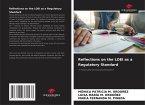Practically since the change from the welfare state model to the neoliberal one, rapid changes in education have been a constant. Politicians are the main actors who allude to the need for educational reforms every time they assume power, but not every educational change implies a reform, and one could even think of a simplistic and indiscriminate use of the term. Educational reforms have their complexities due to the actors involved, their intentions, and the levels involved, among other issues. The levels involved in an educational reform constitute the central axis of the book, which are due to macro causes in the social, political, economic and cultural fields; sources in the pedagogical field and transformations in the structure of the educational system or in some of its parts. Mexican education is the referent of the reforms, but the analysis of reforms in Mexico can serve as a basis for studies in other countries, not only in Latin America, but also in other parts of the world, especially since the second half of the 20th century.
Bitte wählen Sie Ihr Anliegen aus.
Rechnungen
Retourenschein anfordern
Bestellstatus
Storno








